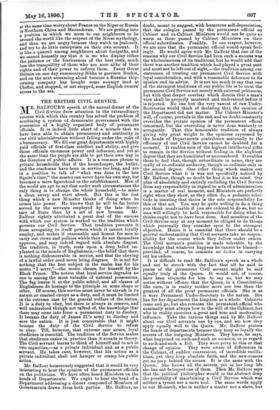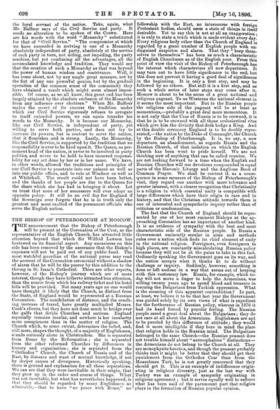THE BRITISH CIVIL SERVICE.
MR. BALFOUR'S speech at the annual dinner of the Civil Service drew attention to the extraordinary success with which this country has solved the problem of combining a system of democratic government with the possession of a highly organised body of permanent officials. It is indeed little short of a miracle that we have been able to obtain permanency and continuity in our civil administration without falling under the yoke of a bureaucracy. We fill our great departments with highly paid officials of first-class intellect and ability, and give those officials enormous power and influence, and yet at the same time the people are able to get their own way in the direction of public affairs. It is a common phrase in private households that if the housekeeper, the butler, and the coachman have been in service too long, and are in a position to talk of " what was done in the late Squire's time," the master can never have his own way, but becomes a mere figurehead in the establishment. Men of the world are apt to say that under such circumstances the only thing is to change the whole household,—to make a clean sweep and start afresh. But this is the last thing which a new Minister thinks of doing when he comes into power. He knows that he will be far better served by the servants employed by the late Secre- tary of State than by a set of new brooms. Mr. Balfour rightly attributed a great deal of the success with which our system is worked to the tradition which governs our Civil Service. That tradition prevents it from arrogating to itself powers which it cannot loyally employ, and makes it reasonable and honest for men to carry out views and policies which they do not themselves approve, and may indeed regard with absolute disgust. The tradition, in truth, rests upon a deep belief im- planted in the minds of Englishmen,—the belief that there is nothing dishonourable in service, and that the obeying of a lawful order need never bring disgrace. It is not for nothing that the first subject in the realm has for his motto "I serve,"—the motto chosen for himself by the Black Prince. The notion that loyal service degrades no one is among the most valuable of national possessions. The fag learns it at the public school, and all classes of Englishmen do homage to the principle in some shape or other. Of course, this service must never be slavish in its nature or exacted except as a duty, and it must be limited in the extreme case by the general welfare of the nation. It is a duty to obey, but there is always in reserve, and well understood though not talked of, the knowledge that there may come into force a paramount duty to disobey. It became the duty of James II.'s army to disobey and save the nation. It is just conceivable that it might become the duty of the Civil Service to refuse to obey. Till, however, that extreme case arises, loyal obedience is essential. The tradition of the Service makes that obedience easier in practice than it sounds in theory. The Civil servant learns to think of himself and to act in two capacities,—as a private individual and as a public servant. He takes care, however, that his action as a private individual shall not hamper or cramp his public action.
Mr. Balfour humorously suggested that it would be very interesting to hear the opinion of the permanent officials on the politicians. We have often heard Ministers on the heads of Departments. We ought to hear the head of a Department addressing a dinner composed of Members of Governments drawn from both parties. Mr. Balfour, no doubt, meant to suggest, with humorous self-depreciation, that the eulogies passed by the permanent official on Cabinet and ex-Cabinet Ministers would not be quite so warm as those passed by Cabinet Ministers on their official subordinates. Possibly. In one respect, however, we are sure that the permanent official would speak feel. ingly. He would agree with Mr. Balfour that one of the reasons why our Civil Service had been such a success was the wholesomeness of its traditions, but he would add that there was another tradition which had played a great part and must not be left out of sight,—the tradition among our statesmen of treating our permanent Civil Service with loyal consideration, and with a reasonable deference to its opinion and its advice. It is not too much to say that one of the strongest traditions of our public life is to treat the permanent Civil Service not merely with external politeness, but with that deeper courtesy which directs that a man's view shall be properly mastered and understood before it is rejected. No one but the very rawest of raw Under- Secretaries would think of declaring that the opinion of the Department did not matter. The Cabinet Minister's will, of course, prevails in the end, and no doubt constantly overrides the private opinion of the permanent official concerned, but the overriding is never done wantonly or arrogantly. That this honourable tradition of always giving very great weight to the opinions expressed by the heads of Departments contributes materially to the efficiency of our Civil Service cannot be doubted for a moment. It enables men of the highest intellectual gifts to remain in the Service without feeling in the slightest degree that they are humiliated or unconsidered. It enables them to feel that, though subordinate in name, they are really of co-ordinate authority, though co-ordinate only in the second degree. One other thing which makes our Civil Service what it is was not specifically noticed by Mr. Balfour, though no doubt he bad it in his mind. Our plan of absolutely and entirely excluding the Civil Service from any responsibility in regard to acts of administration is a matter of real moment, and Ministers are perfectly right when they show, as they often do, a pedantic solici- tude in insisting that theirs is the sole responsibility for this or that act. You may be quite willing to do a thing you think unadvisable if you are ordered to do so, but no man will willingly be held responsible for doing what ho thinks ought not to have been done. And members of the Civil Service may at any moment be obliged to do things which personally they consider open to the strongest objection. Hence it is essential that there should be a general understanding that Civil servants take no respon- sibility for the course which they follow under orders. The Civil servant's position is made tolerable by the knowledge that whatever happens he cannot be blamed— provided, of course, he commits no inches in carrying out his orders.
It is difficult to read Mr. Balfour's speech as a whole and not be struck with the fact that all he said in praise of the permanent Civil servant might be said equally truly of the Queen. It would not, of course, have been etiquette for him to say so, but we may notice without offence that the Queen, in a Constitution like ours, is in reality neither more nor less than the greatest of all the great permanent officials. She is as it were Permanent Under-Secretary to the nation. She has for her department the kingdom as a whole. Cabinets come and go, but she remains the permanent official who nominally must always bow to the will of the Cabinet, but who in reality exercises a great and wise and moderating influence. Take the various things said by Mr. Balfour about our Civil servants one by one, and see how they apply equally well to the Queen. Mr. Balfour praises the heads of departments because they keep so loyally the secrets of the outgoing Ministers. They know, he says, what happened on such-and-such an occasion, or in regard to such-and-such a Bill. They were privy to this or that change of opinion. They were aware of differences in the Cabinet, of sudden conversions, of incredible vacilla- tions, yet they keep absolute faith, and the new-comers get no peep behind the scenes. It is the same with the Queen. She knows all the secrets, yet in her long life she has not betrayed one of them. Then Mr. Balfour says that the political philosopher would in the abstract deny the possibility of maintaining a Civil Service which was neither a tyrant nor a mere tool. The same words apply to our Monarch, who is neither a master nor a slave, but the loyal servant of the nation. Take, again, what Mr. Balfour says of the Civil Service and party. It needs no alteration to be spoken of the Crown. Here are his words with the word " Monarchy " substituted for that of " Civil Service." " The compromise at which we have succeeded in arriving is one of a Monarchy absolutely independent of party, absolutely at the service of each party in turn, not aiding, not impeding, the party machine, but yet combining all the advantages, all the accumulated knowledge and tradition. They would say that the creation of such a Monarchy as that was beyond the power of human wisdom and contrivance. Well, it has come about, not by any single great measure, not by the fiat of any one powerful genius, but by the gradual operation of the common sense of the community they have obtained a result which might seem almost impos- sible. Of course, as we all know, this great end has been largely attained by the absolute exclusion of the Monarchy from any influence over elections." When Mr. Balfour makes the secret of its success the tradition under which our Civil Service rigorously refuses to arrogate to itself extended powers, we can again transfer his words to the Monarchy. It is because our Monarchy, like our Civil Service, is independent of party, yet willing to serve both parties, and does not try to increase its powers, but is content to serve the nation, that it flourishes and is strong. Lastly, the Monarchy, like the Civil Service, is supported by the tradition that no responsibility is ever to be fixed upon it. The Queen, as per- manent head of the nation, is never to be involved in party politics, and never to be held to have incurred responsi- bility for any act done by her or in her name. We have, in other words, allowed the traditions and principles of our Civil Service to penetrate into our palaces as well as into our public offices, and to rule at Windsor as well as at Whitehall. The result could not have been better, and the thanks of her people are due to the Queen for the share which she has had in bringing it about. Let us trust that none of her successors will ever adopt an opposite policy. It will be an evil day for England if the Sovereign ever forgets that he is in truth only the greatest and most exalted of the permanent officials who serve the English nation.







































 Previous page
Previous page